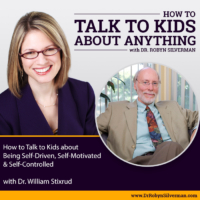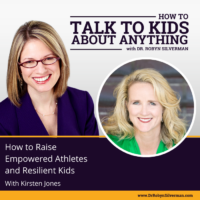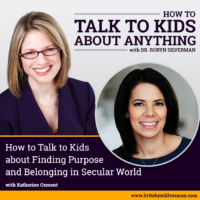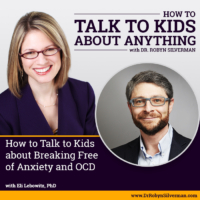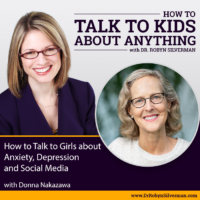Podcast: Play in new window | Download
Subscribe: Apple Podcasts | RSS | More
How to Raise Resilient, Self-Reliant, and Secure Kids in an Age of Anxiety
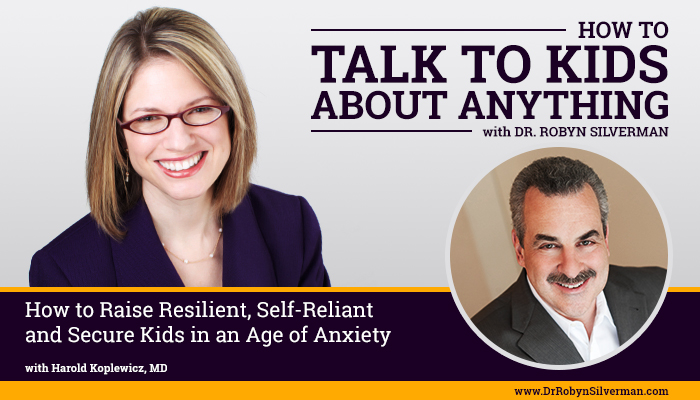
This podcast focuses on how to raise resilient, self-reliant and secure kids in an age of anxiety. The most common health disorders among children are mental health disorders. That’s 17 million children! We must help children cope with stress and learn from their mistakes—and we can do this through scaffold parenting. Scaffold parenting is a framework based on structure, support and encouragement. Dr. Robyn Silverman speaks to Dr. Harold S. Koplewicz, founding president and medical director at the Child Mind Institute and author of the new book, The Scaffold Effect, on the How to Talk to Kids about Anything podcast.
Special guest: Dr. Harold Koplewicz
Many of us, as parents, teachers, coaches and mentors in the lives of children are having issues coping with the complications and frustrations that the pandemic has brought upon our lives. But just imagine what the children are going through. Even before the pandemic started, the rates of childhood anxiety and depression were skyrocketing– with one in five children under the age of eighteen diagnosed with a mental health disorder. In fact, more kids are affected by mental illness than asthma, peanut allergies, diabetes, and cancer combined. During the pandemic, numbers are rising- and post pandemic, those numbers are expected to climb even higher. How can we raise resilient, self-reliant and secure kids in an age of anxiety? My next guest will impart that the sweet spot, for raising resilient, self-advocating kids who can cope with stress and learn from their mistakes is scaffold parenting—a framework that posits that parents are the scaffold that provides the structure and support for the child as he or she grows up. Parents are there to protect and guide but not to impede learning or positive risk-taking.
are having issues coping with the complications and frustrations that the pandemic has brought upon our lives. But just imagine what the children are going through. Even before the pandemic started, the rates of childhood anxiety and depression were skyrocketing– with one in five children under the age of eighteen diagnosed with a mental health disorder. In fact, more kids are affected by mental illness than asthma, peanut allergies, diabetes, and cancer combined. During the pandemic, numbers are rising- and post pandemic, those numbers are expected to climb even higher. How can we raise resilient, self-reliant and secure kids in an age of anxiety? My next guest will impart that the sweet spot, for raising resilient, self-advocating kids who can cope with stress and learn from their mistakes is scaffold parenting—a framework that posits that parents are the scaffold that provides the structure and support for the child as he or she grows up. Parents are there to protect and guide but not to impede learning or positive risk-taking.
Harold S. Koplewicz, MD, is one of the nation’s leading child and adolescent psychiatrists. The founding president and medical director of the Child Mind Institute in New York City and San Mateo, California, he has been repeatedly named in America’s Top Doctors, Best Doctors in America, and New York magazine’s Best Doctors in New York. He has appeared on Today, CBS News, CNN, The Oprah Winfrey Show, and Anderson Cooper 360°, and he is quoted regularly in the New York Times, USA Today, and The Wall Street Journal. Dr. Koplewicz is the author of the new book, The Scaffold Effect. He lives with his wife in New York City.
Important Messages:
- We have the ability to make things better or worse as parents- we can make it better by being a scaffold. We need to look at structure (routines, rules), support (financial, emotional, validation, empathy- process difficult feelings), encouragement (push out of the comfort zone where they can learn, but not too hard that they enter the danger zone.)
- Parenting burnout comes from lack of self-care- we need to tend to ourselves first- especially during Covid when it feels intense and we are constantly running a marathon.
- SELF CARE: What can we do to help ourselves get through Covid when we feel so restricted- start with sleep. Put on different clothes than what we slept in in order to start our day. Have good meals- eat breakfast and dinner together if you can. Get some routine. Exercise. Go for a walk for 20 minutes. Get a flush of new blood into the brain. Your heart is a pump! Mindfulness also helps. Be with your thoughts. Don’t fight the bad thoughts. Get away from other people’s garbage. Be grateful in front of your child- because then you are being grateful in front of yourself.
- Gratitude- brings you away from “the sky is falling” and the political
 divisiveness, financial issues and helps you remember the good. Adds more gas in the tank.
divisiveness, financial issues and helps you remember the good. Adds more gas in the tank. - Part of what’s in parents’ DNA is to want to just “fix” things instead of support kids in doing it themselves.
- Negative tracking- problematic. Be aware. Can I say 3 things that are positive about my child before I give them a negative that needs to be corrected? Also, understand confirmation bias. Do you have a “good kid” and a “bad kid” or a “lazy kid” and a “productive kid?” Watch these labels. The “bad kid” can’t get out of the box. The “good kid” feels anxious. When we give a child a negative label, it’s a self-fulfilling prophesy. When we change that, they can rise to the occasion- room to grow. This takes time and some work. Kids won’t notice it in the beginning but after a while they are pleased that mom and dad are catching them being good. Label the good. “I’m really impressed with how hard you worked studying for the algebra test.” Not just “good job.”
- Criticism: We want our kids to be better. We don’t want them to be hurt when they show behavior that’s seen in a negative way. “I’m not sure you’ve been studying as effectively as possible. I know you didn’t want a tutor, but I think we need someone who is a better teacher than me or you- someone who will give you more attention than your regular teacher.” Disappointed for the child.
- Sometimes let it go. Insignificant behaviors that need active ignoring. Take deep breaths and let it go. If I want to be able to talk to them about the content of our conversations, or you have a probing question, you have to let the little things go.
- Need warmth and connection- but also need dispassion when trying to not make a big deal about something. Can’t match their emotions- you can be empathetic but not matching when trying to help. Allow your pain to take a back seat.
- A child may not be the same as you- so you need to be patient if the trait is important to you- and give the tools.
- How do you validate kids without escalating? Recognize that they are intense as teens. Not always thinking- pre-frontal cortex is changing. Don’t minimize. “Oh, that’s not so bad.” Have warmth and empathy. Validate but don’t get swept away. Empathy. “This sucks. And it’s worse for you than it is for me.” Required to help support the building but not fix it.” Give structure but don’t tell your child he has to be something that he doesn’t want to be. Instead, ask questions- show curiosity!
- “Once the scaffold goes down, like our children go off to college, if we’ve done the job correctly, our children know when to put the scaffold back.”
- The sex talk doesn’t have to be done all at the same time- it’s not just one talk. Answer the questions and then wait for more.
- Speak honestly to your child and answer his or her questions so that later on that child isn’t embarrassed to come back to you and ask more.
- Sex talk is more than just one thing. Opportunity- intimacy, reciprocity, making someone else feel good and allowing them to make you feel good.
- Many girls feel pressure to do it because the boy wants to do it- not recognizing while we
- all have rules, it’s about trust, feeling good, about boundaries.
- Don’t turn into the college professor giving a lecture!
- Big talks: Drugs, sex, politics. We all come with biases.
- Marijuana- can have a negative effect on kids with ADHD and anxiety. Panic attacks. Why are you so opposed in particular in young brains?
- We lose our influence during the teen years- but yet we are the most influential. Learn ethics from parents. What is important to you? I want you to know how I feel- it does have influence!
- It’s normal to want to protect our children- we don’t want them to get hurt or be embarrassed but there is a need to push them out of the comfort zone and into the growth zone. We do it slowly. “That was brave.” “That was important.” Encourage even if fall off. Reinforce for taking those brave steps.
- Bravery is remembered! Can impact others in a positive way. What would have been the worst thing that could have happened? Can be transformative for that child. The more children take positive risks, the more confidence they will have in taking positive risks.
- If you protect your child too much, he’s going to be a hot-house orchid. He’s not going to be a sky-scraper, or a ranch or a split level or anything. He’s going to have to be so tenderly cared for that there is no resilience.
- Don’t be so hard on yourself. Especially now. Important to know children’s assets and deficits. But even more so, right now, being more tolerant of our own deficits and our own limitations. Take the long view. This is a tough time. Be kind to yourself. This will do wonders to becoming a good parent.
- So many losses right now. Losing people- but also loss of time with others, going to school, going to work, etc. We will get through this.
Notable Quotables:
-
-
- “During Covid, it feels like you are in a marathon that is muddy—and not just slippery muddy- it’s muddy up to your knees where you think; ‘I can’t do this. I need a second wind, a third wind…I hate marathons!”
- “Once a week be grateful in front of your child because then
 you are being grateful in front of yourself.”
you are being grateful in front of yourself.” - “Self-care puts a little more gas in the tank so that parents have some energy. If they don’t have energy, they can’t stand up so they can’t scaffold their kids.”
- “Part of parents’ DNA is to want to fix things. It’s not a scaffold, it’s ‘let me just get the plaster and the brick and let me fix it’ which really isn’t good for kids.”
- “Confirmation bias is something that parents do that we have to stop. “This is the good kid, this is the bad kid, this is the lazy kid.” If we do this, it really presents a problem because the ‘bad kid’ can’t get out of the box and the ‘good kid’ feels anxious that they are going to fail the parent and no longer be good.”
- “It’s essential if you want to change the blueprint, then I have some hard work to do.”
- “For some kids, it can be hard to catch them doing something good, especially if they are very rambunctious or hyperactive- but still, there is plenty of good to be caught.”
- “Talk to your kids like you are talking to a colleague. You wouldn’t be as rough with a colleague as sometimes, we are with our kids.”
- “Being a Scaffold Parent is work. Drawing a new blueprint is work. But G_d, is it worth it!”
- “Remember, adolescents are either burning or freezing. They are very rarely just warm. They hate you, they love you. They are speaking a slightly different language and their brains are different than a child’s brain or an adult brain.”
- “As a parent, I am required to help support the building, but not fix it.”
- “I realized that my child was going to be a skyscraper and I wanted a ranch.”
- “Allow your children to change the blueprint for themselves…the scaffold has to follow.”
- “Once the scaffold goes down, like our children go off to college, if we’ve done the job correctly, our children know when to put the scaffold back.”
- “If you protect your child too much, he’s going to be a hot-house orchid. He’s not going to be a sky-scraper, or a ranch or a split level or anything. He’s going to have to be so tenderly cared for that there is no resilience.”
- “The key to raising resilient, self-reliant and secure kids is patience, encouragement, warmth, awareness and acceptance of ourselves that we, as parents, will make mistakes and in the same way as we have to bounce back and try again is the model that we have to show our kids.”
-
Part of parents’ DNA is to want to fix things, says @DrKoplewicz of @ChildMindInst. It’s not a scaffold, it’s ‘let me just get the plaster, the brick & let me fix it’ which isn’t good for kids. Listen in on #TalktoKids podcast
Click To Tweet
Resources:
Social Media for Dr. Robyn:
- facebook.com/DrRobynSilverman
- twitter.com/DrRobyn
- instagram.com/DrRobynSilverman
- facebook.com/HowToTalkToKidsaboutAnything
The post How to Raise Resilient, Self-Reliant, and Secure Kids in an Age of Anxiety with Dr. Harold Koplewicz – Rerelease appeared first on drrobynsilverman.com.

